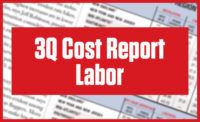The signs were all there. The project manager’s attention level was down. Tasks that he would typically complete in one day took a week. Mistakes cut the value of the plans he prepared. He no longer followed up with key people on the team. In the end, he lost interest in both the project management and technical aspects of his job, so his managers called him in for a talk that led to a parting of ways. “He told us he was glad to be fired, because the pressures of the job had become too much,” says a former manager.

In an industry now adding the economic downturn to an already long list of on-the-job pressures, some employees are “dying” at work without literally passing away. And there are others who see signs they could face the same fate: the office mate who started out full of spirit but sank into a sullen funk after six months of 12-hour workdays. Or the enterprising and pleasant colleague who became a steady source of bitterly tinged sarcasm after failing to win her boss’s support in a jobsite conflict.
Then there’s the co-worker who started out sincere and attentive but, following a disappointingly small pay raise, now shrugs off mistakes and floats through the day in a cloud of indifference.
With the recession wreaking employment havoc throughout large industry segments, there’s reason to be concerned about the hazards to those who still have their jobs. The factors that, in various combinations, produce burnout are all there: long hours, greater workloads, job uncertainty, poor prospects for pay and promotion, ambiguous roles on projects and time and budget pressure that accelerate the risk of mistakes or compromise standards of quality and ethics.
So, too, is evidence of the professional stupefaction, emotional exhaustion and sense of ineffectiveness such conditions can provoke. To some extent, employers understand the dangers of dejected and wearied employees, and a few are doing more than the minimal amount to help workers manage, if not completely avoid, stress. Others keep piling on the work.
Just bringing up the subject among staff and managers violates an industry taboo, long dictated by the industry’s prevailing culture of service and sacrifice. Many professionals feel they are supposed to take whatever comes their way to keep their jobs, even if they are badly exploited. This atmosphere burns out people.
The Heat Over Burnout
ENR.com asked its readers earlier this month if construction’s culture of self-sacrifice was killing them. Many respondents said yes, but for different, often generational, reasons. ENR also talked to engineers and project managers and tracked significant scholarly research on the subject.
Two years ago, engineer and scholar Brenda Yip and her co-author, educator Steve Rowlinson, analyzed the dire effects of burnout on Hong Kong’s overworked engineers. In a paper published in the American Society of Civil Engineers’ Journal of Management in Engineering, they wrote that the normal practices during Hong Kong’s recession—which included an average 54-hour workweek—bred a crop of dejected, cynical and drained engineers who were more likely to suffer illnesses and make mistakes on the job. A 2003 study of Australian engineers by other researchers turned up similar results.
“When I was working in the industry for 13 years, I could identify some of the common symptoms,” Yip told ENR. “I had no knowledge of the terminology or of burnout, and people did not treat it very seriously.”
Studying Symptoms
One common mistake managers make is to confuse burnout, the result of prolonged stress from a combination of factors, with stress from a single cause that will eventually disappear, says Yip. As the sources of stress multiply...




Post a comment to this article
Report Abusive Comment